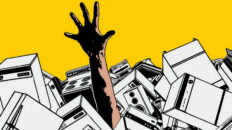Happy graduation season! Summer and the oh-so-short sloughing of responsibilities approaches. Target (Sorry, I plum forgot we’re boycotting Bullseye over Satan-tuckers for toddlers.) Walmart shelves are stocked with Class of 2023 plastified merch manufactured by their future overlords in Guangdong. The right is irate that higher-ed incubators of progressivism invited leftie commencement speakers. Ivy League universities are breaking federal law by hosting “affinity” (racially segregated) graduation ceremonies. Sir Edward Elgar’s estate is eager for its annual royalty ka-ching.
Which is what brings us to the epiphanic origin of this column. No, I’m not going to ape Joseph Epstein and give in prose a commencement address drawn from the depths of my imagination—fun and self-indulgent as that may be. Beg pardon, but I’m actually going to be more self-indulgent.
While humming “Pomp and Circumstance” coming out of the shower the other morning, as one does in late May, I had one of those Proustian moments of long-forgotten remembrance: the final episode of Nickelodeon’s “Doug.” For the unfamiliar, or those who didn’t spend countless, unsupervised hours glued to the boob tube during their Capri Sun years, “Doug” is a cartoon about an average kid with abnormally skin-colored friends navigating the frightening social world of sixth grade. He has a crush on a girl with Mayonnaise for a surname; he wears a belt on his head and tighty whities over his shorts as the make-believe Quailman—typical adolescent whimsy.
On the series finale of the tween drama’s Nick run, Doug’s entire class is thrilled about grade-school graduation. The prospect of a new school, new teachers, new times tables, new hair in formerly hairless places, and new everything unsettles young Doug. His friends are unperturbed, thrilled to be escaping sixth grade, ready to progress to the next pimply stage of life. Yet Doug remains inchoately concerned. Eventually, because the half-episode runs just ten minutes to clear room for Toys“R”Us commercials, he settles his anxiety by taking comfort that, even when leaping into the unknown, his classmates will be there to tackle long division with him.
It’s a simple lesson in maturation: don’t fear change, embrace it. Grab the unforeseeable bull by the horns and master its bucks and back kicks. Become an architect of your own life!
Despite learning all my social cues from Nicktoons, I didn’t take Doug’s embrace-the-new morale to heart. Which is why, upon remembering the episode, I re-felt the pang of anxiety of my own high-school graduation. I’ve written before of my muddling late-teen years. My “moment of realization” didn’t click until around my junior year at a state university. Before that righting revelation, I embodied the community-college wastrel, with aspirations as high as, erm, getting high. Plus maintaining my job as a taco-stuffer at a local theme park and keeping up a respectable “c” average. I had basically moved on to 13th and 14th grade, while all my friends opted for actual colleges, and I stayed home, commuting 20 minutes to the campus parking lot, as opposed to the average length of a Death Cab for Cutie song I had on repeat in my trusty Toyota beater.
Considering my unpromising prospects, I too was less than enthused about graduating high school, and reaching the end of the guided track that was K-12 public schooling. When Horace Mann sought to import the Prussian model of uniform tutelage to the United States, by way of Boston, he probably didn’t envision schools manufacturing passive pupils. But that’s what his system of public-supported education has become: a coddling cradle, moving pace by pace on a prefigured assembly line, the edges too high to peer out over for a glimpse of the wider world. Then, once twelfth grade ends, the trigonometry books snap shut, your ratty p.e. uniform gets binned, you’re abruptly dumped out with only a piece of mass-printed paper for a map.
So that’s it: after fourteen-odd years, so long, good luck! (Though I don’t recall many teachers explicitly wishing me “good luck.”)
For anyone accustomed to the plodding along of mandatory public pedagogy, the process can feel like abandonment. Even betrayal. That may be why the Biden Administration is pushing for “free” community college—to make 13th, 14th, and 15th (for the less homework-inclined) grade the new normal. Extending the école conveyer belt also has the added benefit of exposing more students to the 1619 Project, so even more anti-American couch-coasters can be produced, hacked off and ready to blame “the system” for their own shortcomings. And vote for hard-left candidates, naturally.
The long mollycoddling is starting to show its stultifying effect. Just over half of 18-year-old Americans have driver’s licenses, down from 80% two decades ago. One survey found nine out of ten parents reporting their children are too anxious to pass the motorist test—and not because a visit to the DMV is a secular katabasis. Moreover, youth employment is trending downward, which, on the plus side, means fewer instances of mistakenly getting vegan, no-sugar-added cricket sorbet instead of the cookies and cream you ordered at Baskin-Robbins. On the negative, humanity-extinction side, more AI kiosks. The pandemic’s forced isolation was a definite horizon shortener for students. But the teen driving and work trends were already slipping before those careless Wuhan lab rats wrecked our lives. COVID just surfaced the acute anxiety already present, which explains why some teens still insist on staying masked when the salutary benefits are marginal at best.
One of the reasons I eventually got my act together as a budding twenty-something was, besides minimal parental prodding, I drove my own car and had an enjoyable, though demanding, job. Even in my irresolution, I still regularly used the implements of independence.
For today’s up-and-comers who’ve marinated in safetyism most of their life? The future is bleaker, unless you count Adderall and TikTok as confidence builders. (Spoiler: they’re the opposite.)
For many graduates, the mortar-board toss is the frighteningly unpredictable event that starts their adult lives—and even that’s now banned. Probably because the cap’s pointy edges represent innate toxic masculinity, or some other such woke nonsense. O boring new world, that has such nebbish in’t!
Perhaps I was better served by a Nickelodeon-seeped childhood than I thought.














[…] For one, it’s graduation season, with mortar boards making their brief flight heavenward as “Pomp and Circumstance” marches to the top of the iTunes chart. And for two, twice the topic of college ed’s efficacy […]